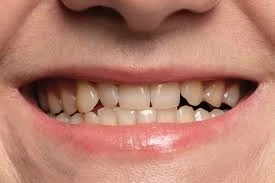Introduction:
Teeth discoloration is a common concern that can affect one’s confidence and oral health. While various factors contribute to the color of your teeth, including lifestyle choices and dental hygiene, vitamin deficiencies also play a significant role. This article explores What vitamin deficiency causes yellow teeth in Dubai and what you can do to address these issues.
Understanding the Role of Vitamins in Oral Health
Essential Vitamins for Healthy Teeth
Vitamins are crucial for maintaining overall health, and they play a significant role in the health and appearance of your teeth. Essential vitamins include Vitamin A, Vitamin C, Vitamin D, and Vitamin K. Each of these vitamins contributes to oral health in specific ways:
Vitamin A: Promotes healthy mucous membranes and supports the health of gums and teeth.Vitamin C: Essential for collagen production, which maintains gum health and the integrity of the tooth enamel.Vitamin D: Facilitates calcium absorption, which is vital for strong teeth and bones.Vitamin K: Helps with calcium regulation and bone health, indirectly benefiting dental health.Impact of Vitamin Deficiencies on Tooth Color
A lack of these vitamins can lead to various oral health issues, including changes in tooth color. Here's how deficiencies in specific vitamins can impact the appearance of your teeth:
Vitamin A Deficiency
Effects on Tooth Enamel
Vitamin A deficiency can lead to a condition known as xerostomia, or dry mouth, which can affect the tooth enamel's health. Without adequate Vitamin A, the enamel can become weaker and more prone to staining. Additionally, the lack of Vitamin A can cause the gums to become inflamed, contributing to further discoloration of the teeth.
Gum Health and Discoloration
Vitamin A is also crucial for maintaining healthy gums. Deficiencies can lead to gum disease, which can cause gum recession and expose the tooth roots. Exposed roots can be more susceptible to staining, resulting in a noticeable change in tooth color.
Vitamin C Deficiency
Collagen Production and Enamel Integrity
Vitamin C is essential for collagen synthesis, which is necessary for maintaining the structure of the enamel and gums. A deficiency can lead to weakened enamel, making teeth more susceptible to discoloration. Additionally, Vitamin C deficiency can result in bleeding gums and gum disease, which can affect the overall appearance of your teeth.
Gum Disease and Tooth Discoloration
Gum disease resulting from a lack of Vitamin C can cause gum recession, which exposes the tooth roots. These areas can become discolored more easily due to their porous nature.
Vitamin D Deficiency
Calcium Absorption and Tooth Strength
Vitamin D is crucial for calcium absorption, which is necessary for strong, healthy teeth. A deficiency in Vitamin D can lead to decreased calcium levels in the body, resulting in weaker teeth that are more prone to discoloration and damage. Without enough calcium, the enamel can become more susceptible to staining from food and beverages.
Weak Enamel and Staining
Weaker enamel resulting from Vitamin D deficiency can make it easier for staining agents to penetrate and alter the color of your teeth. This can lead to a yellowed or dull appearance.
Vitamin K Deficiency
Calcium Regulation and Tooth Health
Vitamin K plays a role in regulating calcium in the body. A deficiency can affect bone and tooth health, leading to potential issues with enamel integrity. Weaker enamel due to Vitamin K deficiency can be more prone to staining, resulting in changes in tooth color.
Impact on Tooth Enamel
While Vitamin K deficiency is less common, it can contribute to oral health problems that indirectly affect the color of your teeth. Ensuring adequate Vitamin K intake can help maintain enamel strength and prevent discoloration.
Addressing Vitamin Deficiencies
Dietary Changes and Supplements
To prevent vitamin deficiencies and maintain healthy teeth, it is essential to include a balanced diet rich in vitamins. Foods high in Vitamin A (e.g., carrots, sweet potatoes), Vitamin C (e.g., citrus fruits, strawberries), Vitamin D (e.g., fatty fish, fortified dairy products), and Vitamin K (e.g., leafy greens, broccoli) should be part of your diet.
Professional Advice
If you suspect a vitamin deficiency is affecting your teeth, consult with a healthcare professional. They can recommend appropriate supplements or dietary changes to address deficiencies and improve your oral health.
Conclusion
Vitamin deficiencies can significantly impact the color and health of your teeth. Ensuring adequate intake of essential vitamins is crucial for maintaining bright, healthy teeth and preventing discoloration. A balanced diet, combined with regular dental check-ups, can help you achieve and maintain optimal oral health.


